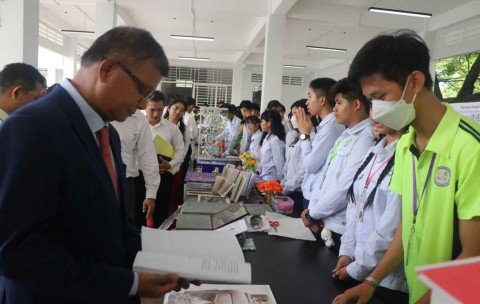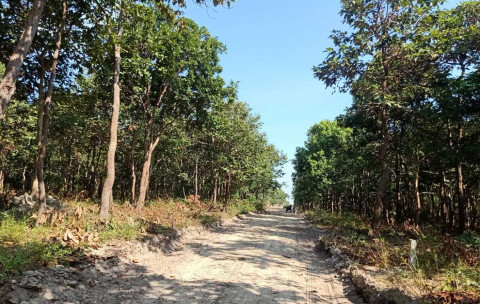
Cambodia has about 2.38 million hectares of land suitable for cashew cultivation, according to the agriculture ministry. Hong Menea
Two internationally-backed cashew processing plants are slated to begin operating in Kampong Thom province, with a potential export manufacturing capacity of more than 20,000 tonnes per year.
The CSNC Agriculture plant, a joint venture between Cambodian and Singaporean investors, broke ground recently, with a production capacity of more than 14,600 tonnes per year.
Mirath Agri Tech, a large Japanese company, has announced it will break ground on a new plant – with an annual capacity of 7,300 tonnes per year – next month
Uon Silot, president of the Cashew nut Association of Cambodia (CAC), explained that both factories will be located in Kampong Svay district. CSNC Agriculture’s factory will produce 40 tonnes per day, while the medium-sized Mirath will generate 20 tones.
“Mirath Holding, the parent company of Mirath Agri Tech, is one of the largest companies in Japan. In addition, the company will open a processing plant in the following year which can absorb 25,000 tonnes of crude kernels per year. It will also open a factory which will produce cashew nut shell liquid [CNSL],” he said.
“On December 6, we broke ground on the CSNC Agriculture plant. There are currently three medium-sized factories in operation,” he added.
He noted that an additional five factories are under consideration, but added that at least 30 would be required to absorb the Kingdom’s total output.
Silot cited Suy Kokthean, chairman of the CSNC board of directors, as saying that the company’s capital investment will be divided into two phases, the first of $5 million and the second of $7 million.
He said the factory was built on a total area of 14ha, with 6ha of it paved with concrete. A number of warehouses, with a capacity of about 40 tonnes per day, will require about 200 workers.
“Our ambition is to promote Kampong Thom as the largest part of the cashew industry in Cambodia. We expect to be able to provide more jobs for our people, as well as markets for farmers,” he added.
During a speech on last week’s Cashew Day, Touch Bun Hour, secretary of state at the Ministry of Agriculture, Forestry and Fisheries, highlighted the huge potential of cashews as an industrial crop. He noted the excellent reputation of the Kingdom’s nuts, adding that there is strong market recognition for them, due to their quality, taste and size.
He said they are relatively easy to cultivate compared to other produce, in terms of growth and water demand, with significant resistance to drought and the topography in Cambodia.
He added that currently, about 700,000ha is under cashew cultivation, with Kampong Thom home to the most plantations, at 150,000ha.
At present, Cambodia exports more than 90 per cent of its cashew nuts in a raw, unprocessed state, meaning prices are low.
Bun Hour suggested that Cambodia would benefit greatly from the processing of local cashews for export, by adding value and creating jobs for local workers.
He added that although the cashew sector has developed significantly, it still faces some major challenges, such as low crop production yields and low economic efficiency, as well as a lack of human resources and budget for research. The transfer of production technology and new innovations also remains limited, as does the infrastructure required to support production.
According to the agriculture ministry, Cambodia has about 2.38 million hectares of land suitable for cashew cultivation.
























